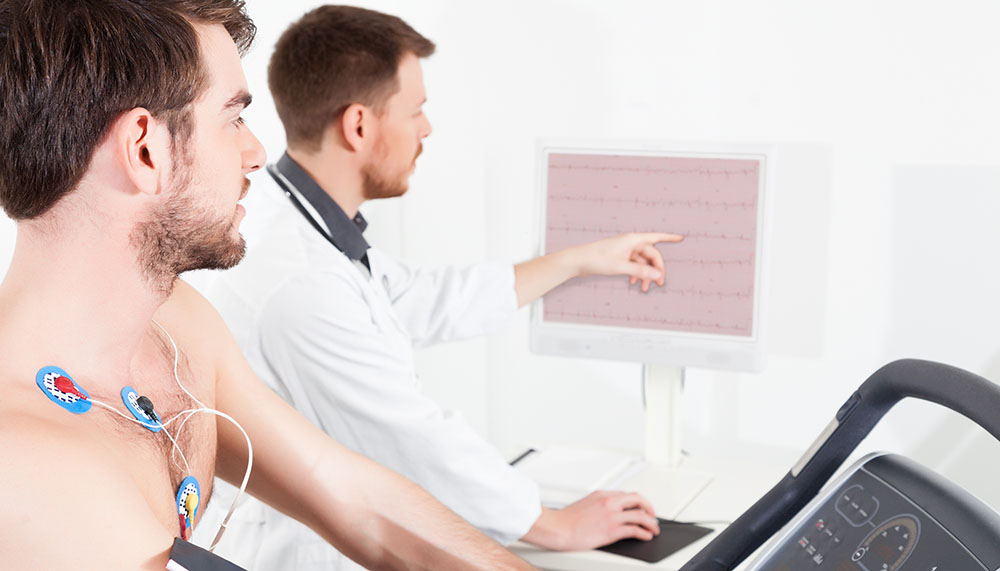
Why You Might Need a Stress Test
A stress test is a diagnostic tool doctors use to determine if your heart is receiving enough oxygen and proper blood flow when you are physically active. It can help determine the best course of treatment and whether any current treatment is working. A stress test also gives doctors insight into the progression of heart disease and how serious a heart condition may be.
During a stress test, you walk on a treadmill or ride a stationary bike while connected to an electrocardiogram machine that monitors your heart's electrical activity. As you exercise, your doctor monitors your heart rate, blood pressure, heart rhythm, and breathing.
There are several reasons why your doctor might recommend you for a stress test, including:
- If you have symptoms of angina or coronary heart disease (chest pains and shortness of breath).
- If you have an irregular heart rhythm, also known as an arrhythmia.
- If you have been leading a sedentary lifestyle and want to begin an exercise program.
- If you have congenital heart disease or congestive heart failure.
You may also need a stress test to undergo a heart procedure, such as a heart transplant or valve replacement. A stress test can determine if it's safe for your doctor to perform those procedures.
A doctor also may recommend a stress test if you work in a high-risk occupation.
What To Expect During a Stress Test
A stress test lasts about 10 to 15 minutes. First, you start walking on a treadmill or pedaling a stationary bike at a leisurely pace, and as you continue the test, the pace increases.
Throughout the test, a technician will monitor your vitals, including your heart rate, blood pressure, oxygen levels, and how hard your heart is working compared to others of your same sex and age. If you have diabetes, a stress test also will monitor your blood glucose level. During the test, you will be asked how you are feeling.
If you can't walk on a treadmill or ride a stationary bike for whatever reason, your doctor will perform a stress test using medication that makes your heart pump harder as if you were exercising.

How To Prepare for a Stress Test
Before administering a stress test, you'll be asked about any chest pain or shortness of breath you may be experiencing. In addition, if you have any conditions that make exercise challenging (arthritis, for example), you should let your doctor know.
Unless your physician instructs otherwise, you should continue taking your medications as directed. You may be instructed to avoid eating, smoking, or drinking caffeinated beverages at least three hours before your test.
You will want to wear loose, comfortable clothing and sneakers.
Other Types of Stress Tests
If primary stress test results are unclear or your doctor needs more detailed information, they may decide you need an exercise stress echocardiogram. This stress test takes an ultrasound of your heart before and during exercise. It helps determine the function of your heart, valves, and blood flow.

Another advanced stress test is called a nuclear stress test. It uses a harmless amount of radioactive substance and cardiac imaging to evaluate the heart's function. A picture of your heart is taken at rest and after exercise to determine if there is a decrease in blood flow, which could indicate a blockage in one of your arteries.
A nuclear stress test is used to determine how bad a blockage is or whether previous treatment (such as a stent or bypass surgery) has been effective.
When a Stress Test Might Not Be the Best Option
Stress tests overall are considered a safe way to gauge heart health, but not everyone is a candidate. For example, if you're at high risk for complications or have advanced coronary heart disease, a stress test may not be recommended.
Likewise, if you've experienced a recent heart attack, have heart muscle inflammation, or have an uncontrollable arrhythmia, your doctor probably won't propose a stress test.
Stress tests also aren't usually recommended as a screening tool to help assess your risk for heart disease later in life if you're relatively healthy and aren't showing any signs or symptoms.
While an effective tool for some patients, stress tests could cause false positives in people without symptoms. Such a scenario could lead to being subjected to high-risk procedures, such as heart catheterization, that aren't necessary.
The best way to reduce your risk of a heart attack is to eat a heart-healthy diet of lean proteins, low-fat dairy, and fruits and vegetables. Exercising and keeping stress in check is important, too.








